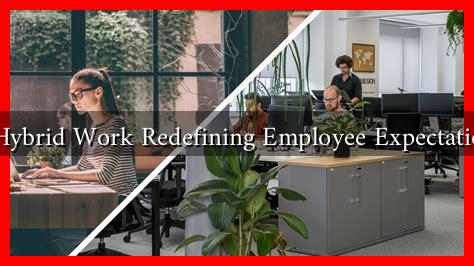-
Table of Contents
Is Hybrid Work Redefining Employee Expectations?
The COVID-19 pandemic has dramatically transformed the workplace landscape, leading to the widespread adoption of hybrid work models. This shift has not only changed how employees perform their tasks but has also redefined their expectations regarding work-life balance, flexibility, and company culture. In this article, we will explore how hybrid work is reshaping employee expectations and what organizations can do to adapt to this new reality.
The Rise of Hybrid Work Models
Hybrid work combines remote and in-office work, allowing employees to choose where they work based on their preferences and job requirements. According to a report by McKinsey, 58% of employees have the option to work remotely at least one day a week, and 30% can work remotely full-time. This flexibility has become a significant factor in employee satisfaction and retention.
Changing Employee Expectations
As hybrid work becomes the norm, employees are developing new expectations that organizations must address to remain competitive. Here are some key areas where expectations are evolving:
- Flexibility: Employees now expect greater flexibility in their work schedules. The traditional 9-to-5 model is increasingly seen as outdated. A survey by FlexJobs found that 73% of respondents cited flexible work arrangements as the most important factor in their job satisfaction.
- Work-Life Balance: The ability to work from home has allowed many employees to achieve a better work-life balance. They expect employers to support this balance by offering options that accommodate personal responsibilities.
- Technology and Tools: With remote work becoming commonplace, employees expect their organizations to provide the necessary technology and tools to facilitate effective communication and collaboration. A study by Gartner revealed that 74% of CFOs plan to shift some employees to remote work permanently.
- Company Culture: Employees are increasingly concerned about maintaining a strong company culture in a hybrid environment. They expect organizations to foster inclusivity and engagement, regardless of where employees are located.
Case Studies: Companies Leading the Way
Several companies have successfully embraced hybrid work models and are setting examples for others to follow:
- Salesforce: The tech giant has adopted a “Success from Anywhere” model, allowing employees to choose their work environment. This approach has led to increased employee satisfaction and productivity.
- Microsoft: Microsoft has implemented a hybrid work policy that emphasizes flexibility and employee well-being. The company has invested in technology to support remote collaboration and has seen a positive impact on employee engagement.
- Spotify: Spotify’s “Work from Anywhere” policy allows employees to choose their work location, whether at home, in the office, or a combination of both. This flexibility has attracted top talent and improved retention rates.
Statistics Supporting the Shift
Several statistics highlight the growing importance of hybrid work and its impact on employee expectations:
- According to a survey by PwC, 83% of employers believe that the shift to remote work has been successful for their companies.
- A Gallup poll found that 54% of employees would leave their current job for one that offers more flexibility.
- Research from Buffer indicates that 98% of remote workers want to continue working remotely at least part-time for the rest of their careers.
Conclusion: Adapting to New Expectations
As hybrid work continues to redefine employee expectations, organizations must adapt to this new landscape to attract and retain talent. By embracing flexibility, supporting work-life balance, investing in technology, and fostering a strong company culture, businesses can meet the evolving needs of their workforce. The shift to hybrid work is not just a trend; it is a fundamental change in how we view work and employee engagement. Companies that recognize and respond to these changes will be better positioned for success in the future.
For more insights on hybrid work and employee expectations, you can visit FlexJobs.

